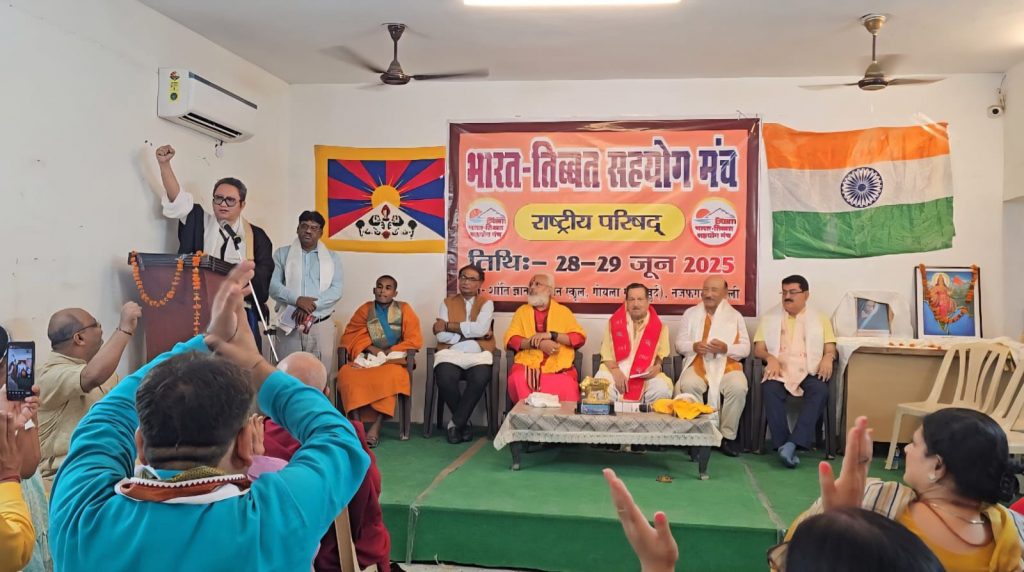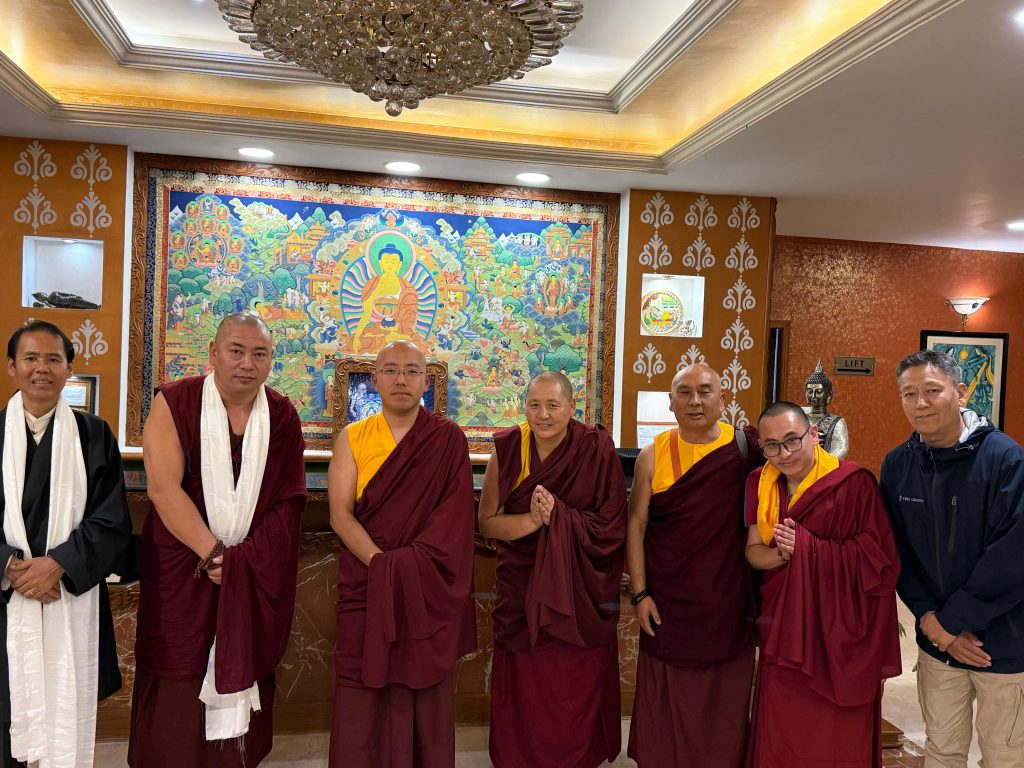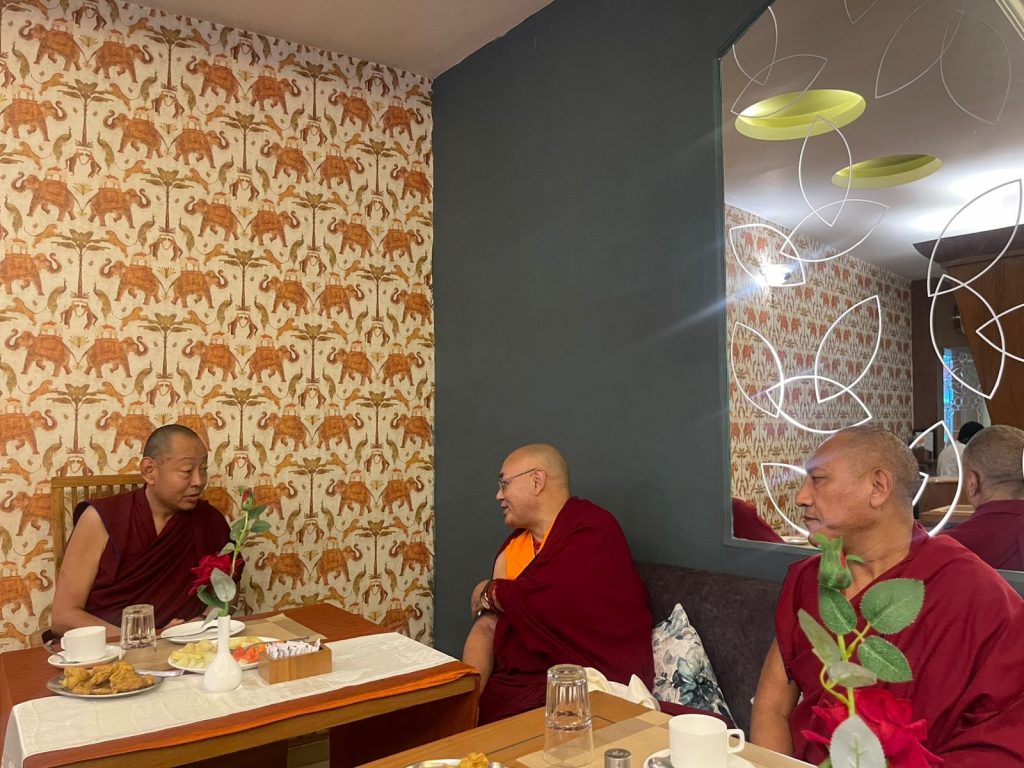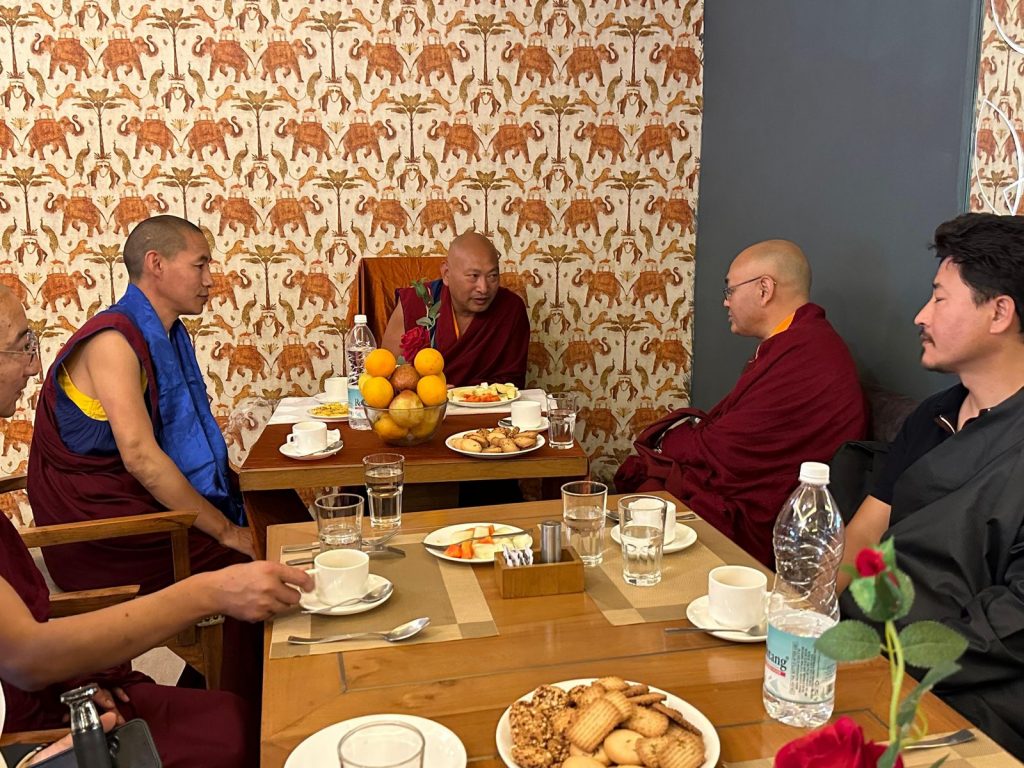Official resolution of solidarity*
Preamble
In 1949, immediately after the establishment of what was described as the People’s Republic of China, the communist Chinese government launched an armed invasion of the free and independent Snowland of Tibet through a series of offensive moves. It culminated in the whole of Tibet, with its national territory and natural resources and inhabitants, coming to be placed under full occupation rule by 1959. This year marks the 70th anniversary of the establishment of the People’s Republic of China. It also marks the 60th anniversary of China’s implementation of “Democratic Reforms” in Tibet and what Beijing calls the peaceful liberation of Tibet and the resultant “emancipation” of “millions of serfs” in Tibet. Finally, this year will also mark the 40th anniversary of China’s implementation of economic reform and opening up policy. This year is thus crucial to China, which recognizes it as marking decades-long anniversaries of a number of trend-setting historical events. What starkly stands out across the entire range of this period, however, is the absence of any change in the direction of improvement in China’s totalitarian policy over Tibet which is defined by violent repression and brutal subjugation.
In 1959, His Holiness the Dalai Lama, the supreme leader of the Tibetan people, fled into exile to India, with more than 80,000 Tibetans following in his footstep in the general exodus. It has now been 60 years since His Holiness the Dalai Lama newly established a democratic government in exile or a central Tibetan administration rooted in freedom. And the decades have been seen him being viewed as the repository of all the hopes in the unwinking gaze of the Tibetan people.
During the period of the occupation rule, which continues to this day, the enemy communist Chinese government has carried out naked killings, detentions, imprisonments, beating and torture, and wanton violations of human rights of the Tibetan people. It has severely curtailed the Tibetan people’s freedom to practice their religious faith. Tibet’s natural environment has been devastated in a reckless quest for mineral resources. The Tibetan language and script has been marginalized. Tourists from outside China have been subjected to tight controls. Freedom of the press has been respected only with destruction. These and other policy actions of the government of China, which together encapsulates the totality of all that is evil, have been highlighted during successive sessions of the Tibetan Parliament in Exile and would presumably warrant no repetition this time. However, the truth is that there has still been no improvement whatsoever in the human rights situation in Tibet. A few examples could be cited to bear this out. These include the references that have been made to the situation in Tibet during the recent session of the United Nations Human Rights Council in Geneva. In particular, during the universal periodic review of China’s report on the implementation of its human rights commitments during the session, a total of thirteen countries discussed the human rights situation in Tibet and expressed criticism of China’s record there. The government of China did not give clear answers to the questions they asked. A number of national and non-government bodies have in their human rights reports in 2018 explained how the situation in Tibet had kept deteriorating considerably.
Today, in the so-called Tibet Autonomous Region mainly, but also in many parts of other Tibetan territories broken up and merged with neighbouring Chinese provinces, China has given the title of “Harmonious Model Monastery” to monasteries and honours such as “law-abiding model patriot” to monks and nuns. It has also issued a call for accomplishing the “Sinicization of religion”. A five-year plan has been launched as a vital work directed at making efforts to reshape Tibetan Buddhism to fit in with the so-called “core socialist values”. Under it, all sorts of meetings have been called in the name of numerous campaigns such as governing to safeguard peace and order, call to love religion and nation, governing to benefit the public, and so on. In some places, monasteries have been banned from organizing side classes to teach Tibetan language during school holidays. In some places a ban has been imposed on students from visiting temples during school holidays. In Tibet’s capital Lhasa, ethnic Tibetans in government employment have been banned from taking part in religious activities, with those violating the order being made liable to lose all their service and government benefits for the rest of their life. At the Yachen Gar Buddhist academy, Tibetans and foreigners have been subjected to special scrutiny. At the Serta Larung Gar Buddhist academy, the holding of the key annual religious festival of Dechen Shingdrub has not been allowed for a number of successive years. Tibetans visiting Nepal and India for pilgrimage have been compelled to return without being able to complete their travels and their passports were confiscated. Tibetan people travelling to other Tibetan areas to pursue religious study or for pilgrimage have all been subjected to routine ban orders and other kinds of coercive orders. Because of these and numerous other kinds of serious violations, a number of international reports on religious freedom, including the United States Commission on International Religious Freedom, have recorded findings of ever tightening controls on freedom of religious belief in in Tibet.
Tibetan language rights activist Mr. Tashi Wangchuk had, in accordance with the rights guaranteed under the constitution of the People’s Republic of China and the national law on Regional Autonomy for Ethnic Minorities in China, petitioned for the implementation of these legal guarantees. But the government of China responded by charging this innocent person with a false criminal offence, put him on trial and convicted him with a jail sentence. Not only that, the government of China prevented his lawyer from even meeting with him. These are patently inhuman conduct on the part of the Chinese government and groups and individuals in the international community who led support for the rights of the Tibetan people have strongly criticized the move even as they still continue to vehemently appeal his case. Nevertheless, not only has the government of China refused to heed the criticisms and appeals but the situation concerning the freedom of language in Tibet continues to remain in a critical state.
In the free democratic world, freedom of the press is considered important enough to be accorded the informal status of the fourth pillar of democracy. However, not only does the authoritarian government of China not accord any such respect to the freedom of the press, but it also allows the flourishing of only government run media which faithfully adhere only to what it orders them to focus and report on. Not a single independent news media outlet is allowed to be established. Journalists from free countries based in China are subjected to all manners of pressure and harassment without any kind of restraining limitation. That is why these journalists regularly face extreme difficulty in being able to cover emergency situations across the People’s Republic of China, especially in Tibet. The Foreign Correspondents’ Club of China based in Beijing said in its latest annual survey report, which was titled as “Under Watch: Reporting in China’s Surveillance State”, that government interference in the work of its members had kept worsening year after year. The survey also revealed that reporting on “sensitive regions” like Xinjiang or Tibet were off limits. Such a finding shows how truly critical the situation of media freedom in China remains.
Ever since China imposed its occupation rule over Tibet, the territory’s entire geographical area has been subjected to mineral ore extractions, building of hydropower projects, damming projects to control the flower of its rivers, diversion of river flows, displacement of Tibetan nomads from their pastures, building of tracks for rail transport infrastructure and so on. These have led to the once enchanting, pristine beauty of Tibet’s natural environment being subjected to devastating destructions. These have resulted in man-made geological and elemental disasters of various types. And it is not just Tibet but also many Southeast Asian countries which have become subjected to such kinds of disasters. Over the past one year, landslides in one part of Tibet led to the natural flow of a river being blocked by mudslides. In particular, it led to a flooding along a stretch of the Drichu river which submerged a monastery named Polo in Jomda County of Chamdo City, resulting in serious damages. This too was a disastrous result from the destruction of Tibet’s natural environment, a fact testified to by a number of top international environmental experts. Nevertheless, China still has an active plan called the Great Western Diversion project under its overall South-North Water Diversion Project under which it looks to divert water from the Machu river to Xining. It also plans to establish a Three Rivers National Nature Reserve at the headwaters of Machu (Yellow), Drichu (Yangze) and Dzachu (Mekong) rivers. Besides, China plans to newly build railway tracks to link Sichuan’s capital Chengdu to Lhasa, Kyidong to Nepal, and so on. Many civil airports in Tibet are being transformed for possible use for military purposes as well. Large numbers of Tibetans in Kham are continuously being relocated to Lhasa, Kongpo, and so on. It remains unclear what definite design underlies these moves by the government of China. Nevertheless, they have devastating effects on Tibet’s natural environment which keeps worsening day after day.
Last year the Public Security Bureau of Tibet Autonomous Region issued a circular listing 22 points on which it called on the members of the public to inform the authorities on what it called incidents of criminal gang activities. This circular was sent out not just in the so-called Tibet Autonomous Region but also throughout other Tibetan-inhabited areas as well. Although the circular employed the terminology of being aimed at preventing and fighting corruption, it was simply an instrument which the government of China still keep using against the Tibetan people in the name of fighting the alleged crime of separatism. During the recently held second session of the 11th regional people’s congress of Tibet Autonomous Region, the regional people’s court said in its report that 25 people had been tried and sentenced for the alleged crime of inciting separatism. It was resolved during that meeting that the Chinese leadership would take safeguarding social stability as its inviolable, number one task in Tibet Autonomous Region to be thoroughly carried out at all levels. On that basis, the meeting vowed that the regional Chinese leadership would take a “clear-cut stance” against “the Dalai Lama clique” and resolutely safeguard national security and core interests of the Chinese people. Before the holding of the two regional sessions, namely the second session of the so-called 11th Tibet autonomous Region people’s congress and the second session of the 11th Tibet Autonomous Regional committee of the so-called Chinese People’s Political Consultative Conference, Tibet Daily, the local party mouthpiece, issued a call, asking people to clearly understand the reactionary political nature of the “14th Dalai”. And in that way the daily regurgitated the fabricated allegations the leadership of the Chinese government had been hurling at him some ten years ago. It once again caused serious upset in the mind of the Tibetan people both in Tibet and in exile. At the beginning of this month, during what is called China’s two annual sessions held in Beijing, Party Secretary Wu Yingjie of the so-called Tibet Autonomous Region claimed in his address to foreign journalists that “Dalai” had not done a “single good thing” for Tibet since he left it 60 years ago. With blatant lies of various kinds such as this, shockingly unimaginable epithets designed only to defame and blaspheme were hurled towards His Holiness the Dalai Lama. Later on, the tirade was continued, including in a “series of articles on the need to clearly understand the reactionary essence of the 14th Dalai Lama” published in the Tibet Daily newspaper. And around the 60th anniversary of the Tibetan national uprising day of the 10th of March, further security clampdown with additional strength was imposed in Tibetan territories encompassing the whole of the three traditional provinces of Tibet, including especially in the capital Lhasa, in the name of such objectives as safeguarding public security through measures which were both outwardly manifest as well as those which were clandestine and therefore hidden from public view. And in an even more outrageous move, the government of China exerted pressure on public figures from a number of countries in attempts to compel them not to take part in the commemoration of the 60th Tibetan national uprising day being held at the seat of the Central Tibetan Administration in Dharamsala. With moves such as these, the government of China has been continuing to make Tibetans in Tibet and in exile to keep feeling nothing but revulsion towards it.
To sum up, because of China’s relentless repression and brutality, which continues to this day, there has not been a moment when four generations thus far of the Tibetan people stopped carrying out a peaceful protest movement against it. In particular, though ten full years have passed since Monk Tabey-la carried out his protest self-immolation, the government of China has never taken an interest to look into the demands voiced by him and the others who also carried out protest self-immolations after him. Several recent media reports said self-immolations were carried out in Tibet by a man named Dopo-la as well as by an unnamed Tibetan young man in protest against the government of China. However, because of the repressiveness of the security clampdown carried out by China, it has not been possible to obtain detailed information about these tragic incidents. In addition, many Tibetan people have continued to carry out various kinds of other peaceful forms of protest actions and the government of China has kept arresting and holding them in detention. Many of the Tibetan people who were arrested and jailed before as well as after the great Earth-Mouse year uprising protests which spread across the territory of Tibet in 2008 continue to suffer torture and brutal ill-treatment to this day. A few among them who have been released over the years had their health condition gravely impaired by their captors. These and other aspects of the conditions in Tibet point towards the fact that the situation there has continued to remain unchanged, marked by grave seriousness. This was the reason why, led by the Vice President of the United States of America, many prominent public figures in the international community have raised discussions on the issue of Tibet. Tibet support groups in the parliaments of countries such as India, Japan, and the Czech Republic, other kinds of Tibet support groups, as well as private individuals, have taken keen interest and assumed responsibility over the issue of Tibet. In particular, the government of the United States of America recently approved a Reciprocal Access to Tibet Act, a legislation that requires China to grant such level of access to Tibet to American citizens as that allowed by the United States to Chinese citizens. There has thus been support for the issue of Tibet in all its diverse aspects from the international community. Nevertheless, the government of China has remained intransigent in continuing its policy of violent repression and brutal attitude without even a whisker of change for the better. The result is the Tibetan people in Tibet remaining in continued subjugation of living such life as if the realm of hell has been transferred to the domain of this earth. Because the Tibetans in Tibet continued to find themselves in a situation of such grave and critical seriousness, it is seen to be important to adopt a resolution of solidarity and empathy with them.
Resolution
1) Be it resolved that the Tibetan Parliament in Exile, while remaining deeply admiring of all the patriotic Tibetan men and women of heroic valour who under the repressive and brutal occupation rule of the communist Chinese government over the past nearly 70 years have sacrificed their all, including their very lives, with a spirit of selflessness and resolute determination, reiterates its demand that the government of China release all the political prisoners in Tibet, including the 11th Panchen Lama, while not only bearing full responsibility for their personal safety but also allowing full enjoyment in Tibet of all the rights and freedoms that are of fundamental and universal value.
2) That although His Holiness the Dalai Lama, given his profound and broadminded vision, only wishes that the Sino-Tibetan dispute be resolved through peaceful discussions on the basis of the mutually beneficial middle way approach, the occupying Chinese authorities have adopted a contrarian position of carrying out nothing but an all-out campaign of defamatory and blasphemous attacks on him, thereby inflicting mental anguish on the Tibetan people and effectively contributing to nothing but opposition to the so–called unity of the motherland and the Tibetan Parliament in Exile wishes to let it be known in no uncertain terms that it is the Chinese government leadership who are the real separatists.
3) That although the government of China has carried out bits of glamour-mongering economic development works in Tibet over the past 60 years, their main objective has been to ensure the movement of Chinese population into the territory by establishing conditions for their permanent settlement, and the Tibetan parliament in Exile wishes to let it be known by the leadership of the occupying Chinese government that these do not serve to compensate even a fraction of the irreparable losses and anguish it has inflicted on the Tibetan people in terms of trampling on their human rights, deprivation of their freedom of religious faith, marginalization of their linguistic heritage, devastation of their natural geographical environment, the violent repression and killing of the Tibetan people through successive generations, and so on.
4) That the leadership of the government of China should stop giving false excuses and citing irrelevant pretexts and let impartial international journalists or an investigation team to find out the truth concerning the tragic situation in Tibet in general and especially on how much faith and love the Tibetan people in Tibet have for His Holiness the Dalai Lama, given Beijing’s recent claims otherwise, and in this context the Tibetan Parliament in Exile challenges the Chinese government leadership to bear in mind the need for them to have the courage and confidence to have the truth or otherwise of their assertions seen verified thus.
5) That the gratitude the Tibetan people in exile owe to the government and people of India for their acts of generosity extended over the period of 60 years thus far is beyond any possibility for any measure of repayment and the Tibetan Parliament in Exile wishes to offer heartfelt thanks to them; that, likewise, the Tibetan Parliament in Exile herewith extends profound thanks of gratitude to all the governments, parliaments, non-governmental groups and organizations, prominent figures, and private individuals in the international community, but especially many countries which have adopted laws and passed resolutions related to the issue of Tibet, for having extended protective solidarity and united front support to the Tibetan people in Tibet and in exile.
6) That it is not just in Tibet but also many other peoples over whom the communist Chinese government has extended its occupation rule and among them the people of East Turkistan are today being subjected to especially harsh repressive measures and the Tibetan Parliament in Exile herewith extends its sense of solidary with the people in that territory and calls for an end to the kind of violent repression that is being carried out there.
7) That although the Tibetan people in Tibet have endured a life that has over the past nearly 70 years resembled as if the realm of hell has been transferred to the domain of this earth, they have maintained their indefatigable spirit of Tibetanness in their courage, resoluteness, loyalty, and so on, and the Tibetan Parliament in Exile herewith takes a solemn pledge that we the Tibetan people living in exile will look up to them as models to be emulated so that when the opportune moment comes of the Tibetan compatriots in Tibet and in exile being reunited, we will only have a contribution to make to them while never engaging in any course of conduct which would cause them to feel disappointed and discouraged. The Tibetan Parliament in Exile resolves thus by a high level of majority of votes on this the 19th day of March in the year 2019.
The above resolution was adopted at the seventh session of the 16th Tibetan Parliament by a high level of majority of votes.
20 March 2019
. . . . . . . . . . . . . . . . . . . . . . . . . . . . . . . . . . . . . . . . . . . . . . . . . . . . . . . . . . . . . . . . . . . . . . . . . . . .
* In case of any discrepancy between this English translation and its Tibetan original, the latter should be considered as authoritative and final for all purposes.




